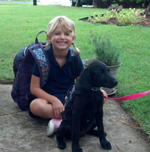|
There's nothing
quite like a bright sunny day to
get your hands dirty at MUSC's
Urban Farm.
That's what
patients of the Pediatric
Endocrinology Outpatient Clinic
found Aug. 25 when they attended
an hour-long, hands-on learning
activity led by groundskeeper Jane
Anne Madden. The event was part of
a series of support group meet ups
for children living with diabetes
and their families.
A very special
participant was Sprinkels, a
diabetes alert dog, who
accompanied her owner, 7-year-old
Kate Hanchon. Sprinkels, whose
uniquely-spelled name was selected
by her young owner, is trained to
alert Kate's parents when she is
experiencing low or high blood
sugar. Sprinkels can alert
caregivers before they begin to
notice some of the symptoms of
hypoglycemia (low blood sugar) or
hyperglycemia (high blood sugar).
 Seven-year-old Kate
Hanchon with Sprinkels Seven-year-old Kate
Hanchon with Sprinkels
Diabetes alert
dogs are so highly trained that
they can detect when their
companion is beginning a blood
sugar high or low 40 minutes
before the companion begins to
exhibit symptoms. The dogs have a
99 percent detection rate and cost
$19,000. The high cost is due
to the training the dog receives
and continues to receive after it
is matched with a family.
Katherine
Nashatker, a pediatric endocrine
dietitian and outpatient nutrition
manager in the Pediatric
Endocrinology clinic, said the
morning was a success in many
ways.
Children
planted lima beans, scouted
through vegetation to point out
their favorite vegetables and took
home seedlings that they planted
in individual seed pots during the
visit. As the children were
seen playing and enjoying hands-on
work in the urban farm, their
parents got a chance to network
and share ideas about caring for
their children who have Type 1
diabetes.
Social worker
Jessica Credeur joined Nashatker
for the educational session, with
the two fielding questions and
reinforcing learning concepts
taught in the clinic, such as
carbohydrate counting.
"Often times
the social groups are an outlet
for parents to network, to discuss
the frustrations of high and low
blood sugars, to learn about other
children's insulin pumps, and to
feel that they are not alone in
the ongoing process that is
managing a child with diabetes,"
said Credeur. "Many parents
communicate with one another in
between social groups, forming
their own play dates or support
networks outside of the clinic."
 MUSC's
Urban Farm garden educator Jane
Anne Madden, right, helps
children enjoy gardening. MUSC's
Urban Farm garden educator Jane
Anne Madden, right, helps
children enjoy gardening.
Credeur said
they want to give parents as much
support as they can.
Diabetes is a
chronic condition that requires
daily medical and nutrition
management. For many parents, the
concept of giving their child
multiple daily insulin injections
is overwhelming, especially in
young elementary school age
children, she said.
The event also
gave parents a chance to see
Sprinkels in action.
Since Kate's
diagnosis two years ago, her
parents have been fearful of
allowing her to sleep alone, with
the concern that her blood sugar
will drop too low in the middle of
the night. For the first time in
years, Kate slept alone in her
bedroom with Sprinkels by her
side, and her parents had newfound
confidence and comfort in her new
companion's ability to help keep
her healthy and safe.
Most families
who desire alert dogs participate
in fundraising and community
awareness events to raise
sufficient funds for a dog for
their child.
After Kate's
family raised sufficient funds for
their own dog, they began
fundraising for a second dog for
another patient. They formed a
non-profit agency (A Dog for Kate)
to continue efforts to raise money
for alert dogs for local patients.
They have seen the difference in
their own lives since obtaining
Sprinkels and want to pay it
forward to the community, said
Credeur.
Want More
Info About Sprinkels and Pals?
To learn more about their
organization or the agency that
trains diabetes alert dogs, visit
http://www.adogforkate.com
and http://www.warrenretrievers.com.
For information
on MUSC's Pediatric Endocrinology,
visit http://clinicaldepartments.musc.edu/pediatrics/divisions/endocrinology/index.htm.
|



 Seven-year-old Kate
Hanchon with Sprinkels
Seven-year-old Kate
Hanchon with Sprinkels MUSC's
Urban Farm garden educator Jane
Anne Madden, right, helps
children enjoy gardening.
MUSC's
Urban Farm garden educator Jane
Anne Madden, right, helps
children enjoy gardening.